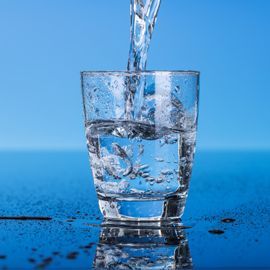Weight Loss Surgery in Jacksonville, Florida
The Importance of Hydration Before Surgery
Just like the earth’s surface, which is composed of about of 71 percent water, we humans are also mostly composed of water — about 60 to 70 percent. You might be surprised to learn just how much water content is in our body:
- Our brain is made up of 74 percent water.
- Our bones are made up of 22 percent water.
- Our blood is made up of 83 percent water.
What this means is that it is important to keep hydrated in order for our organs and body functions to operate optimally.

List of Services
-
How Much Water Should You Drink?List Item 1
The amount of water that a normal weight individual should drink varies mainly based upon your gender, size (height and weight), age, activity level, and environmental/climate factors. While each individual has a unique level of hydration, generally speaking, men should drink 12 cups of water daily and women should drink at least nine cups, according to the Institute of Medicine Dietary Reference Intake (DRI). Of course, if you are exercising vigorously, you may need to increase your fluid intake.
-
Hydration for Weight Loss SurgeryList Item 2
Most of us are used to downing a large glass of water when we are thirsty. This action typically is our natural defense to keep us hydrated. However, staying adequately hydrated after weight loss surgery may be more difficult for you because the reduced flow capacity of your stomach limits the amount of fluid you can drink.
For this reason, it’s helpful to develop some essential hydration habits while preparing for your weight loss surgery. In this way, you’ll have these healthy hydration habits down pat to easily incorporate into your regimen after surgery.
- Drink water first thing when you wake up. Your stomach will be empty, enabling you to consume much-needed fluids. It will also assist in moving any secretion or saliva that may be “sitting” on your redesigned stomach.
- Refrain from drinking water with meals. Your limited stomach space is needed for nutrient-dense foods. You also don’t want to keep flushing the food down, reducing the positive effects of the surgery. Instead, drink water between meals, or up to 1 minute before the meal, and then wait about 30 to 60 minutes after the meal to drink again.
- Avoid sugar-laden and carbonated drinks. These beverages are known to reduce your weight loss and even cause you to regain some weight back. Their nutrition value in general is poor.
- Drinking out of a straw. A straw can minimize air ingestion with your drinks. This will prevent stomach distention.
- Watch your alcohol intake. Alcohol has a dehydrating effect on the body, which can make it more challenging to maintain proper hydration. After some surgeries, alcohol will absorb more quickly leading you to become impaired more quickly. This can be dangerous to you and others so be aware.
- Avoid excessive caffeine. Like alcohol, caffeine can dehydrate your body.
- Sip water slowly throughout the day. Carry a water bottle with you wherever you go as a constant, visible reminder to stay hydrated.
- Analyze the color of your urine. If it is dark yellow, you are most likely dehydrated. Aim for urine that is light in color.
- Drink before you feel thirsty. By the time you are aware of your thirst you are already in the beginning stages of dehydration. Don’t wait for thirst to be your signal to drink.
Since your beverage drinking habits will be modified after weight loss surgery, it’s best to start to incorporate these new drinking behaviors several weeks or months before bariatric surgery. Always discuss any questions or concerns about your hydration levels with Dr. Baptista.
Preparing For Surgery Resources
Patient Success Stories







